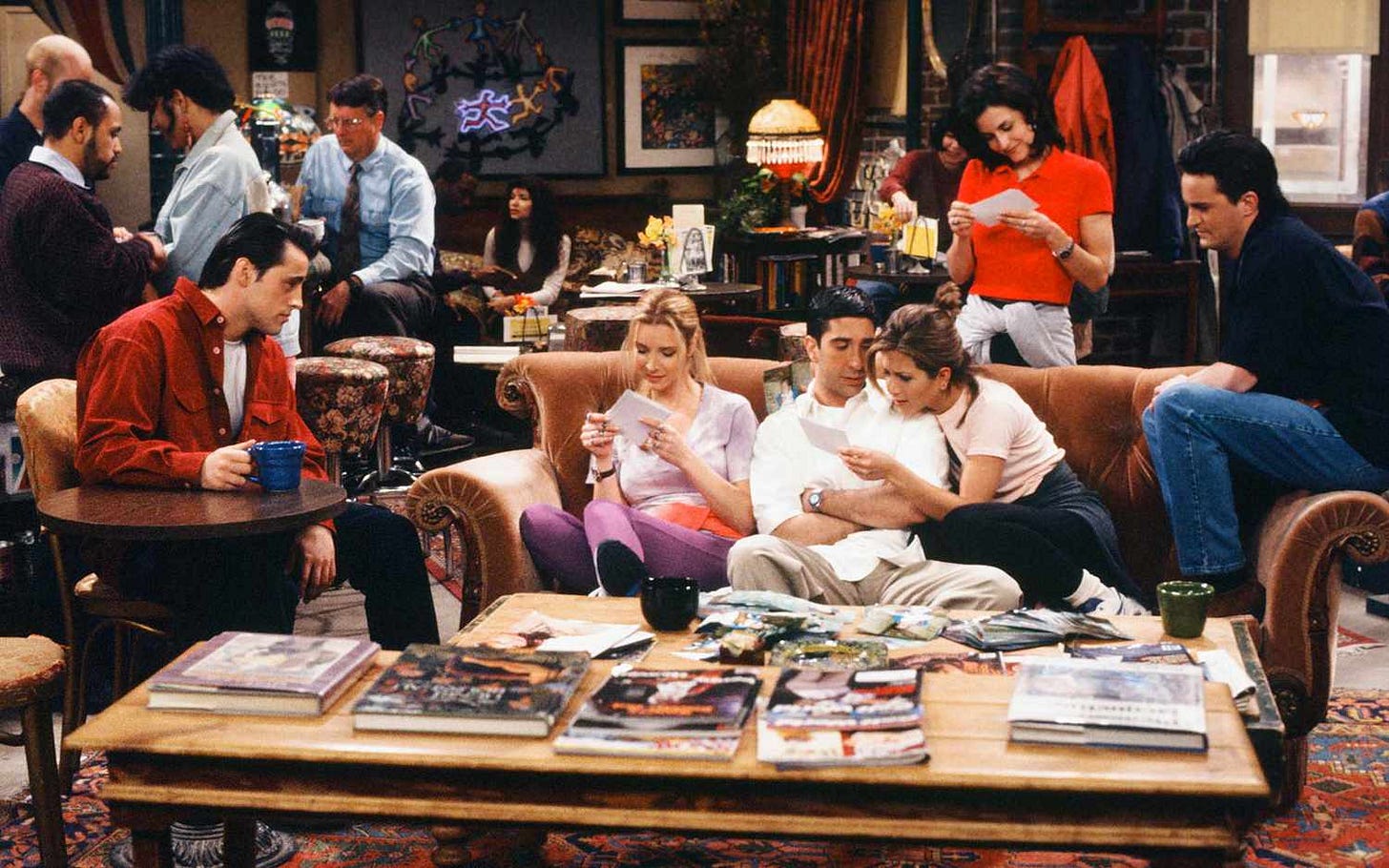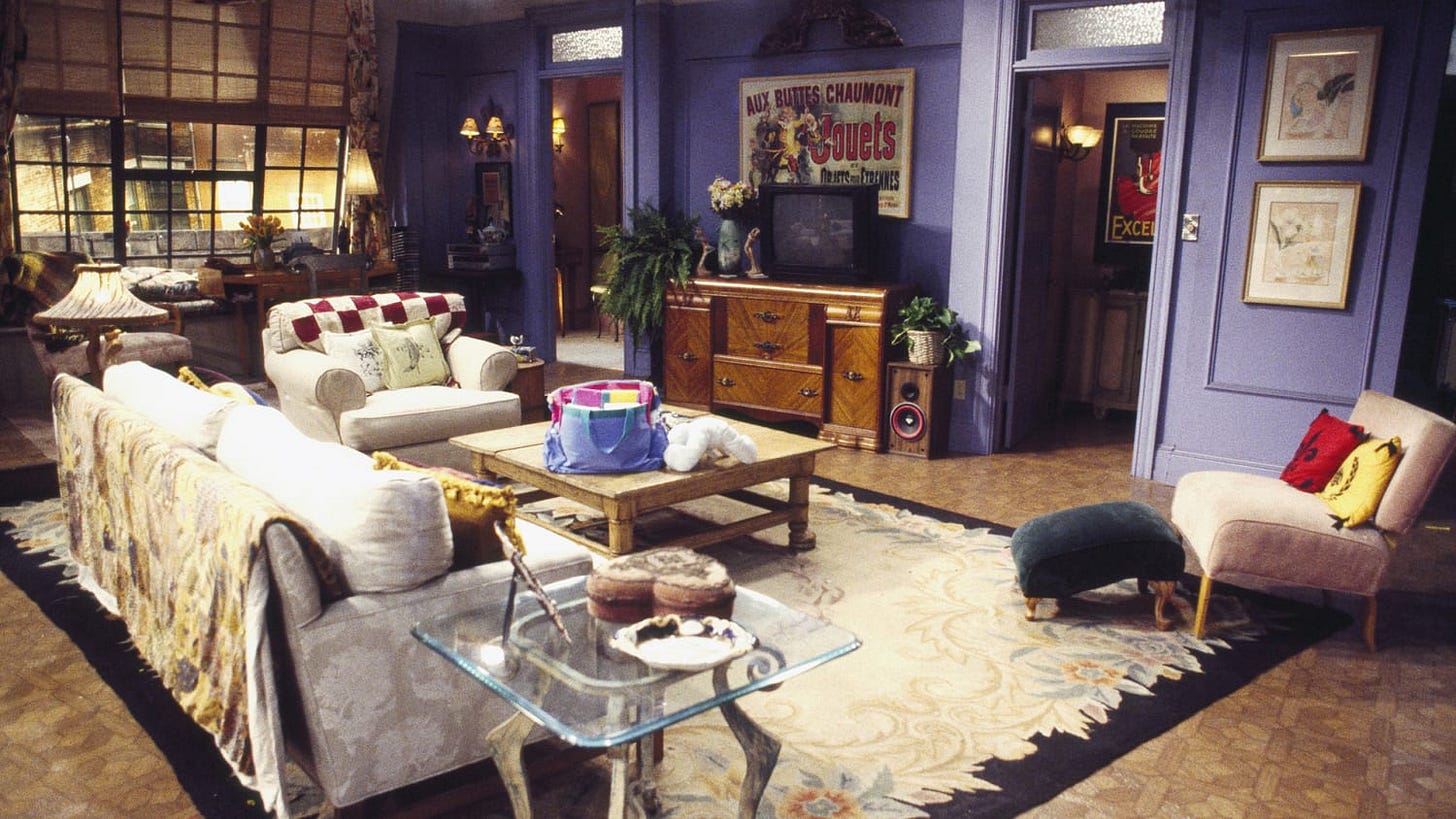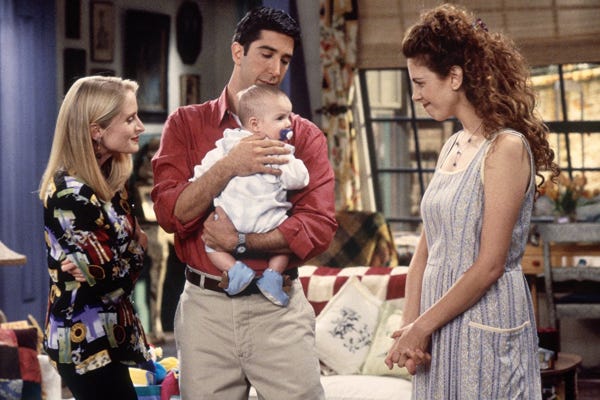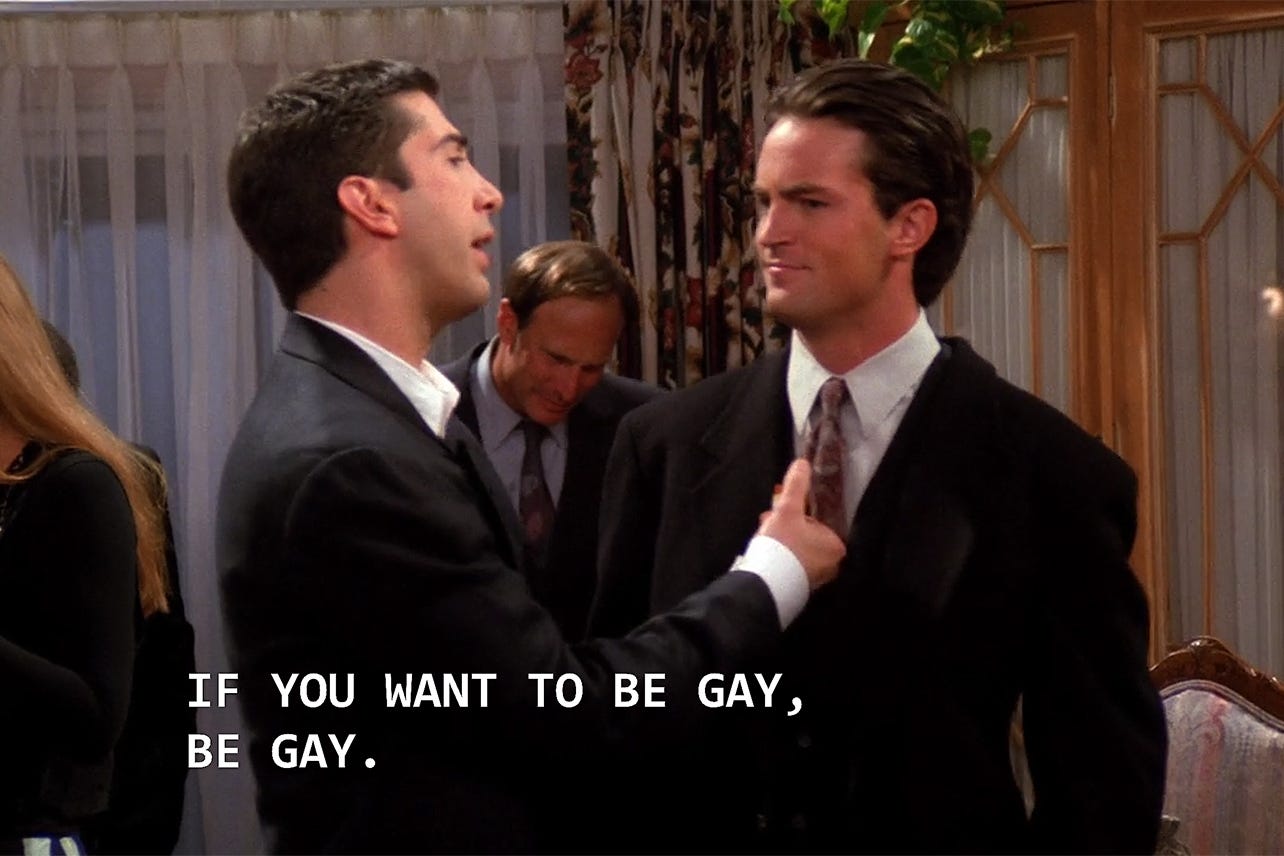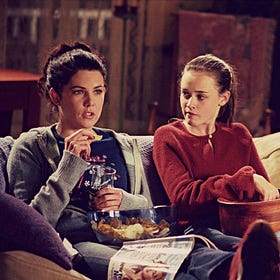Now, I love Friends as much as the next guy. It’s one of those shows that’s infinitely rewatchable: the characters are loveable, the jokes never get old, and it appears to have lost none of its relevance in pop culture. There’s a pretty constant stream of episodes on at least one TV channel going from seasons 1 to 10 and back to 1 again, and you can also stream the entire series at your convenience in many countries. At this point it’s probably mostly nostalgia that keeps me watching it, but nonetheless it’s one of my comfort shows: familiar, predictable, safe.
But one of the things that hasn’t aged well about the show is its attitudes towards various minority groups. Casual racism, homophobia, and transphobia abound, as well as disparaging remarks about fat people, disabled people, and so on. This has been copiously pointed out, so I won’t go over familiar territory.
But what I want to hone in on in particular is the homophobia, because the fact is that Friends was conceived and written by a straight woman and a gay man, a pairing which is usually conducive to allyship. Why, then, is the show so homophobic?
Before I get into the nitty-gritty of it, it would help to set the scene a bit. Friends first aired in 1994. At that point, in the US depictions of gay people on TV were still few and far between. TV as well as film was plagued by censorship throughout the 20th Century when it came to queer representation, especially in the US under the Hays Code. And even afterwards, company executives didn’t want to lose out on money by shocking audiences with the reality that gay people exist and always have.
By the 1970s and 80s it had become acceptable to at least allow gay characters to be portrayed. But in the 90s when Friends aired, homosexuality had not yet been decriminalised in all 50 US states — that wouldn’t happen until 2003 with Lawrence v. Texas, in which all anti-sodomy laws in the country were ruled unconstitutional. Public attitudes towards homosexuals were still not exactly glowing; in fact, they’re still not.
So it’s 1994, and two writers have an idea for a TV show. As I’ve said, the two writers are Marta Kauffman, a straight woman, and David Crane, a gay man, who are also long time friends. The two of them, you’d think, would be sympathetic to the gay community simply by being in the same room together. Not a given, of course, but one would hope.
And at first, the show is actually… pretty gay. There’s a couple called Carol and Susan, one of whom is Ross’s ex-wife, and with whom Ross shares the duty of parenting, a situation which gives rise to a lot of memorable moments. There’s even a wedding episode in which Carol and Susan get married.
Then there’s Chandler. He’s clearly, if not gay, at least bisexual, though he denies this; but he is thought of by nearly everyone as such. In the episode where this ‘issue’ really comes to a head, it’s chalked up to a “quality” that he has, an impression he makes which is distinctly gay-seeming. He also makes occasional comments that would seem to indicate at least an inclination in that direction. I would say also that Phoebe is portrayed as bisexual, at times quite explicitly, though not as often, and it seems to be just another one of her ‘quirks’.
Yes, there are ‘gay jokes’, and Chandler’s apparent fruitiness is often the punchline, but there’s a warmth to the way it’s portrayed, as well as there being actual gay characters who we can be sympathetic to. You can see how Kauffman and Crane might have had fun in the writing room coming up with jokes about gay people, in the way that people make fun of themselves: harmlessly.
But this attitude fades as the series goes on. The show is a big success, they’re making lots of money, and now there’s the pressure to keep it going. And with TV execs being the way that they are, gay humour is a hard sell and too much of a risk. Carol and Susan go from being regulars to only appearing once in a blue moon. Chandler is largely straightened out, and the question of his sexuality is never brought up again. He just has occasional ‘feminine interests’. The gay jokes remain, but the context changes, and thus the entire way that homosexuality is framed by the show changes. It’s judged much more harshly, is basically unrepresented apart from the occasional appearance of Carol and Susan, and becomes simply a thing to be laughed at.
Compare the following two moments, the first from S1E08, “The One Where Nana Dies Twice”:
Shelley: You know, it’s a shame, because you and Lowell would’ve made a great couple.
Chandler: Lowell? Financial services Lowell? That’s who you saw me with?
S: What? He’s cute!
C: Oh yeah… He’s no Brian in payroll.
S: Is Brian…?
C: No! I don’t know. The point is that if you were going to set me up with someone, I’d like to think you would set me up with somebody like him.
S: Well, I think Brian’s a little out of your league.
And this one, from S9E22, “The One With the Donor”:
Chandler: So, what do you think? I want that guy’s genes for my kid! Those eyes, those cheekbones!
Monica: Okay, there’s enthusiastic, and there’s just plain gay!
Yes, both of these moments have gayness as the butt of the joke, but one is discussing homosexuality in a neutral, even positive light, and the other is firmly putting it down. And for me at least, one is quite funny, and the other really isn’t.
It turns out that Chandler was originally written to be the gay character, and clues of this remain in the pilot, but after Matthew Perry was cast the writers chickened out, thinking that a straight actor couldn’t play a gay character. From then on it was, in their words, “write it gay and play it straight”. And eventually, don’t even write it gay.
Personally I’m fine with how Chandler is played in the beginning, but I think he could have been gay or bisexual anyway, despite being played ‘straight’. It would have been interesting to see him have gay relationships or grapple with his sexuality. Instead what we get is mostly him whining about how he can’t get girls. Certainly it was a missed opportunity.
These days, of course, you wouldn’t be able to get away with a lot of this stuff. The culture has moved on, and there’s more sensitivity around various kinds of discrimination. You might argue that it’s gone too far in the other direction, and people have become afraid to push the envelope for fear of offending people, which always leads to boring TV. But I don’t wish to go back to the 90s, culturally speaking. The fact is, the homophobia in Friends was a reflection of society’s attitudes at the time. It wasn’t edgy or divisive or daring in any way; it was predictable and just plain lazy. Take it out and the show wouldn’t have been any worse for it. And there’s a difference between simply portraying social prejudices and reinforcing them.
If Friends was made today, there’s no doubt that Chandler would have remained the gay character. Queer representation has come on a lot since 1994, and for that we can all be thankful. But one can’t help but wistfully wonder what might have been if Chandler was allowed to be queer no matter how he was played. It would have been ground-breaking, that’s for sure; but perhaps the show wouldn’t have been quite so successful as it was. Anyway, in my mind Chandler remains the original bisexual disaster, and basically is ‘the gay character’, though sadly unrealised in that regard.
More TV talk:
The Gilmore Girls Guide to Family Trauma
Yes, I’m extremely late to the party. I’ve been watching Gilmore Girls for the first time. The series originally aired in the early 2000s, and has become a cult classic and a staple watch for many. It certainly encapsulates the small-town New England charm that I’m a big fan of, it’s full of witty dialogue, and the characters are loveable and delightful…




